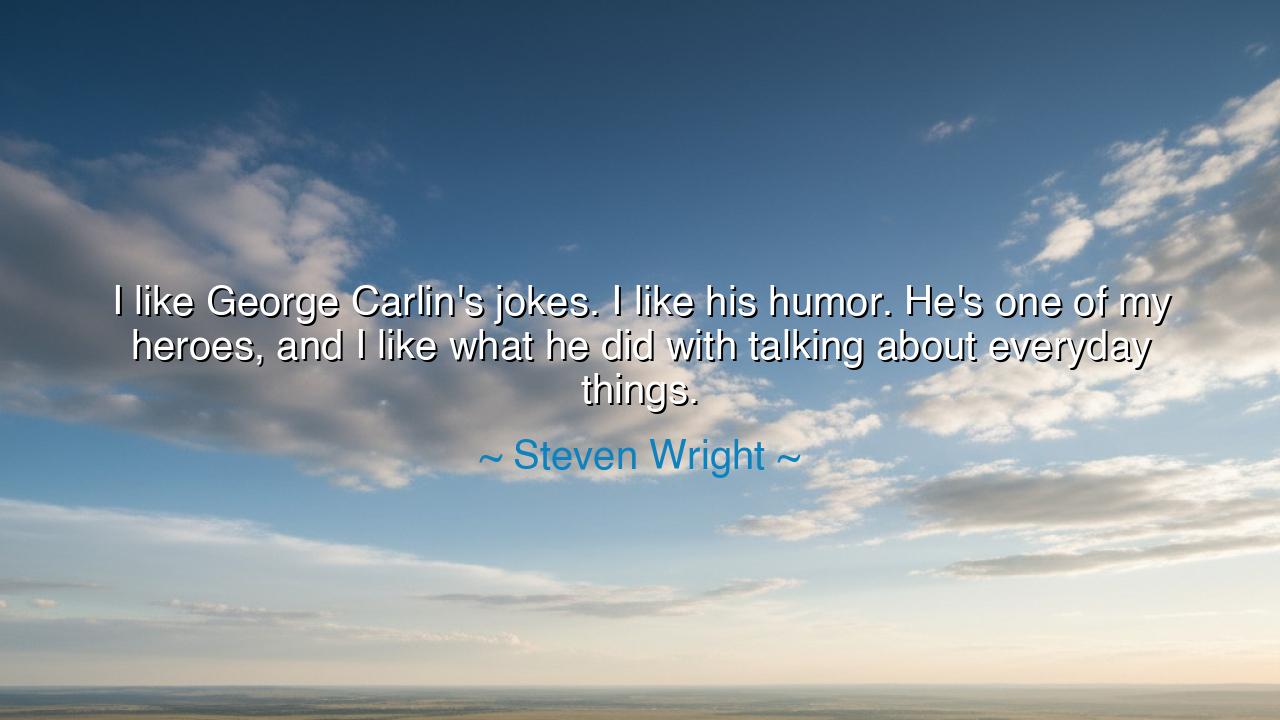
I like George Carlin's jokes. I like his humor. He's one of my
I like George Carlin's jokes. I like his humor. He's one of my heroes, and I like what he did with talking about everyday things.






“I like George Carlin’s jokes. I like his humor. He’s one of my heroes, and I like what he did with talking about everyday things.”
Thus spoke Steven Wright, the philosopher of quiet absurdity, whose deadpan tone conceals the fire of deep perception. In this tribute to George Carlin, Wright reveals not only admiration but a profound truth about art and the human condition — that the everyday, when seen with clarity and wit, becomes sacred. The comedian, like the ancient sage, transforms the ordinary into revelation. Through laughter, he makes the invisible visible, the mundane divine.
To “talk about everyday things” is no small feat. The world passes daily through our hands — the sun rising, the clatter of dishes, the sound of passing voices — yet we rarely see it. The poet, the philosopher, and the humorist are the guardians of this vision. What others ignore, they exalt. Carlin, in his sharp and fearless humor, took the simplest fragments of life — language, habits, hypocrisies — and exposed the contradictions that sleep beneath them. He turned words into mirrors. His jokes were not merely laughter; they were awakenings. Steven Wright, himself a master of subtle irony, recognized in Carlin not only a comedian but a truth-teller — one who pierced through illusion with the blade of humor.
In the ancient world, there were jesters who stood before kings, allowed to speak truths no counselor dared utter. They survived not by flattery, but by laughter — for humor disarms where argument divides. Diogenes, the Cynic philosopher of Greece, lived in poverty yet wielded humor as his weapon. When asked why he mocked society, he replied, “Because men are absurd, and the gods laugh with me.” In the same spirit, Carlin stood before the powerful — of institutions, language, and dogma — and laughed. His humor, though irreverent, was born of reverence for truth. Wright’s admiration is thus the homage of one philosopher of laughter to another.
When Wright says that Carlin is “one of my heroes,” it is not mere adoration. It is the acknowledgment of a lineage — a passing of the torch between kindred spirits. Both men sought not applause, but understanding. Their humor did not exist for spectacle, but for reflection. Steven Wright, with his slow, surreal observations, speaks from the silence between thoughts; Carlin, with his thunderous cadence, spoke from the chaos of the crowd. Yet both shared one mission: to reveal the wonder and absurdity of life. Where philosophers use argument, they used wit; where prophets used parable, they used punchlines.
The origin of Wright’s words lies in gratitude — the humility of one artist who honors his teacher. He saw in Carlin the courage to confront the world with honesty, and the wisdom to find beauty even in its flaws. Carlin’s humor, often mistaken for cynicism, was in truth a kind of faith — faith that truth, however painful, is better than ignorance. Like the Roman satirist Juvenal, who wrote of the corruption of his age, Carlin laughed not because he despised humanity, but because he loved it enough to expose its folly. Wright’s words echo across time as a reminder that humor, when born of insight, is a form of enlightenment.
Consider the soldier who finds a moment to laugh amid battle, or the doctor who jokes softly in the room of the dying — not to trivialize, but to comfort. Such is the power of humor that faces darkness without fear. George Carlin’s “talking about everyday things” was not about smallness, but about universality — he saw that the truth of the cosmos lies in the smallest gestures, the simplest words. Through laughter, he taught what all sages know: that wisdom begins not in grand mysteries, but in the act of seeing life as it is.
So, let this be the lesson drawn from Steven Wright’s reflection:
-
Honor the ordinary, for it holds the key to the extraordinary.
-
Laugh with purpose, for humor can heal what reason cannot.
-
Speak truth through simplicity, for the deepest insights wear the face of the familiar.
-
Seek heroes who awaken your mind, not those who comfort your illusions.
Thus spoke Steven Wright, in praise of a man who turned words into mirrors and laughter into light. His homage to George Carlin reminds us that humor, when true, is not mere amusement — it is revelation. The jester and the sage are not opposites, but reflections of one another. And so, O listener, when you laugh, laugh wisely. Let your laughter be born not from cruelty, but from clarity. For in the laughter that sees truth, there lies both freedom and grace, and through it, the soul learns to see the divine even in the dust of everyday things.






AAdministratorAdministrator
Welcome, honored guests. Please leave a comment, we will respond soon